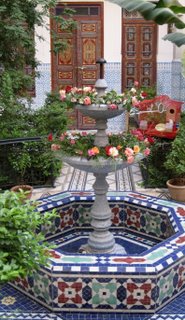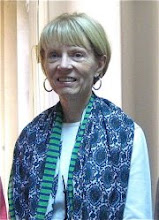
The focus is on the "sacred," since religious instruction and belief remain the greatest influences on the worldview of Algerians. As I begin my day, the hotel security guard handed my taxi driver a sack of candy; and I was offered a piece. As soon as I took it, I realized I couldn't eat it in public. It was the second day of Ramadan (9/25). The papers are full of news about the rise in prices by markets. Shopkeepers seek to profit from the last-minute frenzy of Algerians, purchasing ingredients to prepare their favorite gastronomical delights. Anticipation and excitement about the holiday have overtaken the notion of common sense. Hence, the contradictions inherent in human behavior are visible during Ramadan as in most social events. The month of Ramadan is a time of self-denial-abstention from food, smoking, and sexual desire during the daylight hours. It is a month of piety, spiritual reflection, and concern for the poor. At the same time, it can become a time of excess. Markets become packed with shoppers on the last day before the first day of the holy month. Crowds,long lines, and rushing mark the entire day. Everyone seems to remember one more item to buy for the family gatherings and festive meals, which will take place once the fast is broken (
iftar). New bakeries have opened (
boulangeries) to make special kinds of bread. The yeasty smell of fresh-baked bread can be savored in neighborhoods throughout Algiers. Immense traffic jams of bumper-to-bumper (
pare-chocs contre pare-chocs) congestion begin about 3 PM, as employees leave work and stop for shopping and visiting on the way home. Nothing is spared. Mothers, daughters, and daughters-in-law prepare special dishes, appealing to each and every taste, for the family repast, followed by dessert (oriental cakes) and fancily arranged fruit with tea and coffee. The coffee must be strong to ward off any hint of fatigue or headaches (even migraines) in the first days of the fast, or so the local consensus holds. All this continues until 2 or 3 AM. Seductions of the market, maintaining the family's status, and a quest to fullfil the fantasies of the season lead to increased debt and waste and the inability to distinguish the wished-for from the necessary. End-of-the-month responsibilities and the end-of-the-month feast, Aid al-Fitr, with its similar demands are forgotten. The Egyptian qnd Algerian stock markets took note of this increased personal indebtedness and promptly fell. Moreover, this expense came just on the heels of those incurred with the beginning of the school year. Almost all families have children and undergo the adjustments and costs that go with the return to school. As a day of Ramadan ends, the otherwordly chanting of recitations from the Qur'an can be heard rising from mosques throughout the city, following the ritual call to prayer. Holy books are on display in bookstores, but not under tents in the streets with a myriad of other religious paraphernalia and foods, such as I had seen in Egypt years ago. A certain laicity seems to be evident. Religion is important; but public buildings and the exteriors of shops do not display Ramadan decorations or lights. Yet, there are special television programs and activities in restaurants and theaters. One local restaurant is putting on a "One Thousand and One Nights" special. The state donates a portion of its tax revenues during Ramadan to aid the poor and provide assistance centers to those who suffer health problems from the rigors of fasting. The secular mixes with the religious in a complex, evolving manner. Aristotle, whose works were passed to the West by the Arabs, counseled moderation. Newspapers are making the attempt to pass on the advice, while also participating in the solemnity and celebration of the season.
 The focus is on the "sacred," since religious instruction and belief remain the greatest influences on the worldview of Algerians. As I begin my day, the hotel security guard handed my taxi driver a sack of candy; and I was offered a piece. As soon as I took it, I realized I couldn't eat it in public. It was the second day of Ramadan (9/25). The papers are full of news about the rise in prices by markets. Shopkeepers seek to profit from the last-minute frenzy of Algerians, purchasing ingredients to prepare their favorite gastronomical delights. Anticipation and excitement about the holiday have overtaken the notion of common sense. Hence, the contradictions inherent in human behavior are visible during Ramadan as in most social events. The month of Ramadan is a time of self-denial-abstention from food, smoking, and sexual desire during the daylight hours. It is a month of piety, spiritual reflection, and concern for the poor. At the same time, it can become a time of excess. Markets become packed with shoppers on the last day before the first day of the holy month. Crowds,long lines, and rushing mark the entire day. Everyone seems to remember one more item to buy for the family gatherings and festive meals, which will take place once the fast is broken (iftar). New bakeries have opened (boulangeries) to make special kinds of bread. The yeasty smell of fresh-baked bread can be savored in neighborhoods throughout Algiers. Immense traffic jams of bumper-to-bumper (pare-chocs contre pare-chocs) congestion begin about 3 PM, as employees leave work and stop for shopping and visiting on the way home. Nothing is spared. Mothers, daughters, and daughters-in-law prepare special dishes, appealing to each and every taste, for the family repast, followed by dessert (oriental cakes) and fancily arranged fruit with tea and coffee. The coffee must be strong to ward off any hint of fatigue or headaches (even migraines) in the first days of the fast, or so the local consensus holds. All this continues until 2 or 3 AM. Seductions of the market, maintaining the family's status, and a quest to fullfil the fantasies of the season lead to increased debt and waste and the inability to distinguish the wished-for from the necessary. End-of-the-month responsibilities and the end-of-the-month feast, Aid al-Fitr, with its similar demands are forgotten. The Egyptian qnd Algerian stock markets took note of this increased personal indebtedness and promptly fell. Moreover, this expense came just on the heels of those incurred with the beginning of the school year. Almost all families have children and undergo the adjustments and costs that go with the return to school. As a day of Ramadan ends, the otherwordly chanting of recitations from the Qur'an can be heard rising from mosques throughout the city, following the ritual call to prayer. Holy books are on display in bookstores, but not under tents in the streets with a myriad of other religious paraphernalia and foods, such as I had seen in Egypt years ago. A certain laicity seems to be evident. Religion is important; but public buildings and the exteriors of shops do not display Ramadan decorations or lights. Yet, there are special television programs and activities in restaurants and theaters. One local restaurant is putting on a "One Thousand and One Nights" special. The state donates a portion of its tax revenues during Ramadan to aid the poor and provide assistance centers to those who suffer health problems from the rigors of fasting. The secular mixes with the religious in a complex, evolving manner. Aristotle, whose works were passed to the West by the Arabs, counseled moderation. Newspapers are making the attempt to pass on the advice, while also participating in the solemnity and celebration of the season.
The focus is on the "sacred," since religious instruction and belief remain the greatest influences on the worldview of Algerians. As I begin my day, the hotel security guard handed my taxi driver a sack of candy; and I was offered a piece. As soon as I took it, I realized I couldn't eat it in public. It was the second day of Ramadan (9/25). The papers are full of news about the rise in prices by markets. Shopkeepers seek to profit from the last-minute frenzy of Algerians, purchasing ingredients to prepare their favorite gastronomical delights. Anticipation and excitement about the holiday have overtaken the notion of common sense. Hence, the contradictions inherent in human behavior are visible during Ramadan as in most social events. The month of Ramadan is a time of self-denial-abstention from food, smoking, and sexual desire during the daylight hours. It is a month of piety, spiritual reflection, and concern for the poor. At the same time, it can become a time of excess. Markets become packed with shoppers on the last day before the first day of the holy month. Crowds,long lines, and rushing mark the entire day. Everyone seems to remember one more item to buy for the family gatherings and festive meals, which will take place once the fast is broken (iftar). New bakeries have opened (boulangeries) to make special kinds of bread. The yeasty smell of fresh-baked bread can be savored in neighborhoods throughout Algiers. Immense traffic jams of bumper-to-bumper (pare-chocs contre pare-chocs) congestion begin about 3 PM, as employees leave work and stop for shopping and visiting on the way home. Nothing is spared. Mothers, daughters, and daughters-in-law prepare special dishes, appealing to each and every taste, for the family repast, followed by dessert (oriental cakes) and fancily arranged fruit with tea and coffee. The coffee must be strong to ward off any hint of fatigue or headaches (even migraines) in the first days of the fast, or so the local consensus holds. All this continues until 2 or 3 AM. Seductions of the market, maintaining the family's status, and a quest to fullfil the fantasies of the season lead to increased debt and waste and the inability to distinguish the wished-for from the necessary. End-of-the-month responsibilities and the end-of-the-month feast, Aid al-Fitr, with its similar demands are forgotten. The Egyptian qnd Algerian stock markets took note of this increased personal indebtedness and promptly fell. Moreover, this expense came just on the heels of those incurred with the beginning of the school year. Almost all families have children and undergo the adjustments and costs that go with the return to school. As a day of Ramadan ends, the otherwordly chanting of recitations from the Qur'an can be heard rising from mosques throughout the city, following the ritual call to prayer. Holy books are on display in bookstores, but not under tents in the streets with a myriad of other religious paraphernalia and foods, such as I had seen in Egypt years ago. A certain laicity seems to be evident. Religion is important; but public buildings and the exteriors of shops do not display Ramadan decorations or lights. Yet, there are special television programs and activities in restaurants and theaters. One local restaurant is putting on a "One Thousand and One Nights" special. The state donates a portion of its tax revenues during Ramadan to aid the poor and provide assistance centers to those who suffer health problems from the rigors of fasting. The secular mixes with the religious in a complex, evolving manner. Aristotle, whose works were passed to the West by the Arabs, counseled moderation. Newspapers are making the attempt to pass on the advice, while also participating in the solemnity and celebration of the season.


0 Comments:
Post a Comment
<< Home